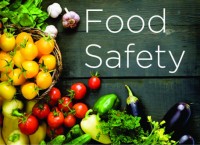Food handling and safety
 Food safety is imperative in any industry that produces, processes or handles food. In Queensland, those businesses that produce/process the following foods may be required to have an accreditation with Safe Food Production Queensland (SFPQ):
Food safety is imperative in any industry that produces, processes or handles food. In Queensland, those businesses that produce/process the following foods may be required to have an accreditation with Safe Food Production Queensland (SFPQ):
- Meat
- Dairy
- Eggs
- Seafood
When it comes to Food Safety Accreditation, it’s important to keep in mind that you must adhere to requirements set by the SFPQ. We can’t offer professional advice on how to do this, however, the SFPQ notes the following (you can read more on actual food safety accreditation here):
“If you are required to have an accreditation with SFPQ you need to demonstrate how you manage food safety risks in your day-to-day operations. You can do this by completing a food safety program or management statement as part of your accreditation requirements.”
General food safety/handling tips
Below are some general food handling tips, particularly in relation to businesses such as restaurants, cafés, etc.
1. Clean kitchen
One of the key ways to keep your food fresh and less likely of forming bacteria is to have a clean, sanitised kitchen. Ensure you keep your kitchen free of vermin, grime, dirt, etc. Keep all all cooking utensils well maintained and wash them thoroughly. If any utensils pose health risks that cannot be resolved via washing, replace them immediately with a new set.
2. Wash hands
We all know that if we don’t wash our hands before we increase our risk of making ourselves sick or contaminating the food we touch. That’s because germs and bacteria thrive in unhygienic environments. So be sure to wash your hands thoroughly before handling any food whatsoever.
3. Avoid cross-contamination
If you’ve just cut up raw chicken meat on a cutting board, do not follow it up by cutting up fresh tomatoes that will be put in a salad. Cross-contamination can lead to food poisoning such as salmonella. You should have separate cutting boards for different produce. If you absolutely need to use the same cutting board for cutting up vegetables after cutting up raw meat, then wash the cutting thoroughly to remove harmful bacteria before proceeding.
4. Store food appropriately
Whether it’s in your restaurant or during transit, your produce needs to be stored appropriately. If certain items of food will grow bacteria if not kept at certain temperatures, be sure that you’re keeping those foods in controlled temperature environments. For freight, these temperatures are often 5 degrees or under – some foods may require higher temperatures.
5. Keep your hair tied up
If you have long hair, you either need to cover it up or tie it up so that there is no risk of it falling into meals you’re preparing. Not only is failure to do so a health code violation, but it’s also an unpleasant surprise for your patrons when their meal is served.